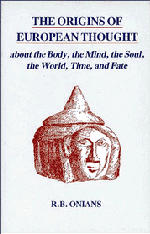Book contents
- Frontmatter
- Contents
- Preface to the first edition
- Preface to the second edition
- Introduction: The Earliest Greeks
- PART I THE MIND AND THE BODY
- PART II THE IMMORTAL SOUL AND THE BODY
- PART III FATE AND TIME
- Chapter I ‘On the Knees of the Gods’
- Chapter II Πείρατα
- Chapter III Καιρός
- Chapter IV The Weaving of Fate
- Chapter V Other Peoples—Fate and Magic
- Chapter VI Μοῖραν ἐπιτιθέναι, πεπρωμένος, etc.
- Chapter VII ʿΥπὲρ μόρον and the Relation of the Gods of Fate
- Chapter VIII The Jars of Zeus, the Scates of Zeus, and the Κῆρες
- Chapter IX Time—Ἦμαρ
- Chapter X Lachesis, Klotho, and Atropos
- Chapter XI Phases of Body and Mind, Sorrow, Sleep, Death, etc.
- Chapter XII Τέλος
- ADDENDA
- Indexes
Chapter XI - Phases of Body and Mind, Sorrow, Sleep, Death, etc.
Published online by Cambridge University Press: 06 August 2010
- Frontmatter
- Contents
- Preface to the first edition
- Preface to the second edition
- Introduction: The Earliest Greeks
- PART I THE MIND AND THE BODY
- PART II THE IMMORTAL SOUL AND THE BODY
- PART III FATE AND TIME
- Chapter I ‘On the Knees of the Gods’
- Chapter II Πείρατα
- Chapter III Καιρός
- Chapter IV The Weaving of Fate
- Chapter V Other Peoples—Fate and Magic
- Chapter VI Μοῖραν ἐπιτιθέναι, πεπρωμένος, etc.
- Chapter VII ʿΥπὲρ μόρον and the Relation of the Gods of Fate
- Chapter VIII The Jars of Zeus, the Scates of Zeus, and the Κῆρες
- Chapter IX Time—Ἦμαρ
- Chapter X Lachesis, Klotho, and Atropos
- Chapter XI Phases of Body and Mind, Sorrow, Sleep, Death, etc.
- Chapter XII Τέλος
- ADDENDA
- Indexes
Summary
Σπεīρον, a ‘winding-sheet’ or strip of cloth to wrap around one, is closely related to σπεĩρα, ‘a cord, coil’, etc. The principle is the same whether it is a narrow strip or a wide one that is wrapped around a man, one band (πεĩραρ ὀïзύος, etc.) or a number of bands (ὀλέθρου πείρατα, etc.). Beside changes of external fortune (victory, poverty, freedom, power, etc.), man is subject to changes in his own person, different states of body and mind. The narrow band is more fitted to inescapable outward fortune or to hampering of body or mind, the wide band or cloak, wrapping, to more pervasive states of body or mind. When a man's hands are stricken with weakness, or his limbs are paralysed, they are ‘bound’ by a god; he who is deluded in mind is ‘bound’ with ἄτη or ἐλπίς. On the other hand he puts on, clothes himself or is clothed with, steadfastness, energy, shamelessness, etc. (δύσεο δʾ ἀλκήν, κρατερὸν μένος ἀμϕιβαλόντες, ἀναιδείην ἐπιειμένος, etc.). In such cases it is consciousness and thus the organs of consciousness that are primarily affected; and so Homer speaks of Achilles as ϕρεσὶν εἱμένος ἀλκήν as Pindar speaks of ἐλπίδες or ἀμπλακίαι ‘hung about’ the ϕρένες. So for Homer love is a covering about the ϕρένες:
ὡς δʾ ἴδεν, ᾥς μιν ἔρως πυκινὰς ϕρένας ἀμϕεκάλυψεν,
and grief:
῞Ηκτορα δʾ αἰνὸν ἄχος πύκασε ϕρένας ἀμϕὶ μελαίνας.
- Type
- Chapter
- Information
- The Origins of European ThoughtAbout the Body, the Mind, the Soul, the World, Time and Fate, pp. 420 - 425Publisher: Cambridge University PressPrint publication year: 1988

